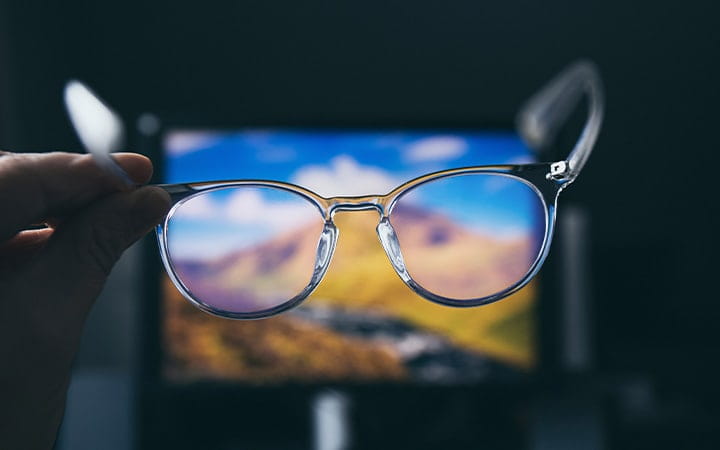Are Blue-Light Blocking Glasses Effective?
August 10, 2023

Blue-light blocking glasses and contact lenses have received a lot of buzz as a remedy for digital eye strain and also for reducing sleep disturbances. But do lenses that purport to block blue light actually work?
Because blue light can interfere with melatonin, a hormone that regulates sleep, blocking blue light emitted by digital screens may help you sleep better. But the jury is still out on whether the filtering lenses are effective at reducing digital eye strain, says Thomas Stokkermans, OD, Director of Optometric Services at University Hospitals.
Digital Eye Strain on the Rise
“While digital eye strain (DES) was a problem before, it has become worse since the pandemic,” Dr. Stokkermans says.
“One study showed that the average time people spend on digital devices increased during the pandemic by an average of 1 hour a day, increasing to 17.5 hours a day for heavy users and to 4.3 hours a day for non-heavy users.”
Symptoms of digital eye strain include blurred vision, dry eyes, light sensitivity, headaches, itching eyes, neck and shoulder pain or difficulty concentrating. Several things happen to your eyes as you use digital devices, Dr. Stokkermans says. One is that you actually blink less, which causes dry eyes.
“One study showed that the blink rate decreased three-fold, from an average of 22 blinks per minute to 7.6 blinks per minute when looking at a screen,” he says.
You also may experience eye strain and fatigue because the focusing muscle (the ciliary muscle) in the eye has to do extra work to focus on a close object, he says. The problem becomes worse in your 40s, which is the age that many people start needing reading glasses or bifocals.
How Eye Fatigue is Assessed
A test called critical flicker fusion frequency (CFF) detects how fast a light has to flicker for you to stop noticing that it is flickering and it appears solid. When you have eye fatigue, your CFF goes down and slower flickering light is still seen as solid.
“CFF is used to test how different types of glasses can reduce eye strain,” Dr. Stokkermans says. “Using CFF, it was shown that blue-blocking glasses help reduce eye fatigue and strain, and the more blue blocking that was present in the glasses, the more it helped.”
However, the research is mixed. Research out of State University of New York found that both complete and partial blue light blocking lenses had no beneficial effect on eye strain after reading on a digital device for 30 minutes.
“This researcher theorized that eye strain from focusing on an object that was close up and activating the focusing muscle for long periods of time was the true culprit, not the blue light” Dr. Stokkermans says.
Tips for Preventing Eye Strain
- Use artificial tears to prevent dry eyes.
- Try following the “20-20-20” rule: Take a 20-second break every 20 minutes by looking 20 feet away. It helps refocus the eyes and may temporarily improve blink rate.
- Make sure your body positioning is optimal when using a computer. The screen should be 20-28 inches from your eyes and the top of the screen should be slightly below horizontal eye level, says the American Optometric Association.
- Get your eyes checked regularly.
- Wear the correct prescription.
- Choose the right type of glasses. Options include:
- Bifocals with a line
- Progressive addition lenses (also known as progressive lenses)
- Office lenses
- Reading glasses
Dr. Stokkermans says that office lenses are designed for digital device use and provide a much larger area to read a screen clearly than bifocals or progressive lenses.
“Using the correct prescription in your glasses, including the correct type of glasses, may be even more important than whether you get blue-blocking lenses or not.”
Blue Light and Sleep
Because blue light from digital screens can interfere with melatonin, it’s recommended to stop using digital devices at least two hours before going to bed. But most people don’t follow this advice.
Blue-light blocking glasses may provide a benefit under these circumstances. “One study showed that blue-light blocking glasses, when worn two hours before bedtime, helped improve sleep and better performance at work the following day,” Dr. Stokkermans says.
Related Links
The University Hospitals Eye Institute is ranked among the best in the country, conducting innovative research and applying the most advanced techniques and treatment in ophthalmological care. Learn more.


